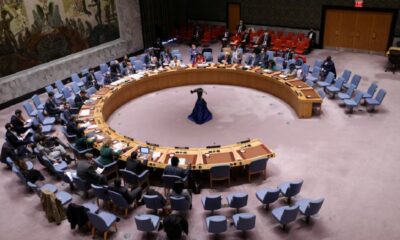COVID-19
Afraid of needles? China using inhalable COVID-19 vaccine

The Chinese city of Shanghai started administering an inhalable COVID-19 vaccine on Wednesday in what appears to be a world first.
The vaccine, a mist that is sucked in through the mouth, is being offered for free as a booster dose for previously vaccinated people, according to an announcement on an official city social media account, AP reported.
Scientists hope that such “needle-free” vaccines will make vaccination more accessible in countries with fragile health systems because they are easier to administer. They also may persuade people who don’t like getting a shot in the arm to get inoculated.
China wants more people to get booster shots before it relaxes strict pandemic restrictions that are holding back the economy and are increasingly out of sync with the rest of the world. As of mid-October, 90% of Chinese were fully vaccinated and 57% had received a booster shot.
A video posted by an online Chinese state media outlet showed people at a community health center sticking the short nozzle of a translucent white cup into their mouths. The accompanying text said that after slowly inhaling, people hold their breath for five seconds, with the entire procedure completed in 20 seconds.
“It was like drinking a cup of milk tea,” one Shanghai resident said in the video. “When I breathed it in, it tasted a bit sweet.”
The effectiveness of non-needle vaccines has not been fully explored. Chinese regulators approved the inhalable one in September, but only as a booster shot after studies showed it triggered an immune system response in people who had previously received two shots of a different Chinese vaccine.
Regulators in India have approved a nasal vaccine, another needle-free approach, but it has yet to be rolled out. The vaccine, developed in the U.S. and licensed to Indian vaccine maker Bharat Biotech, is squirted in the nose.
China has relied on domestically developed vaccines, primarily two inactivated vaccines that have proven effective in preventing death and serious disease but less so than the Pfizer and Moderna vaccines at stopping the spread of the disease.
Authorities on Wednesday ordered the lockdown of 900,000 people in Wuhan, the city where the virus was first detected in late 2019, for at least five days. In remote Qinghai province, the urban districts of Xining city have been locked down since last Friday.
In Beijing, Universal Studios said it would close its hotels and attractions “to comply with pandemic prevention and control.” The city of more than 21 million people reported 19 new cases in the latest 24-hour period.
COVID-19
WHO declares end to COVID global health emergency

The World Health Organization said Friday that COVID-19 no longer qualifies as a global emergency, marking a symbolic end to the devastating coronavirus pandemic that triggered once-unthinkable lockdowns, upended economies and killed millions of people worldwide.
The announcement, made more than three years after WHO declared the coronavirus an international crisis, offers some relief, if not an ending, to a pandemic that stirred fear and suspicion, hand-wringing and finger-pointing across the globe, AP reported.
The U.N. health agency’s officials said that even though the emergency phase was over, the pandemic hasn’t finished, noting recent spikes in cases in Southeast Asia and the Middle East.
WHO says thousands of people are still dying from the virus every week, and millions of others are suffering from debilitating, long-term effects.
“It’s with great hope that I declare COVID-19 over as a global health emergency,” WHO Director-General Tedros Adhanom Ghebreyesus said.
“That does not mean COVID-19 is over as a global health threat,” he said, warning that new variants could yet emerge. Tedros noted that while the official COVID-19 death toll was 7 million, the real figure was estimated to be at least 20 million.
Tedros said the pandemic had been on a downward trend for more than a year, acknowledging that most countries have already returned to life before COVID-19.
He bemoaned the damage that COVID-19 had done to the global community, saying the pandemic had shattered businesses, exacerbated political divisions, led to the spread of misinformation and plunged millions into poverty.
When the U.N. health agency first declared the coronavirus to be an international crisis on Jan. 30, 2020, it hadn’t yet been named COVID-19 and there were no major outbreaks beyond China.
More than three years later, the virus has caused an estimated 764 million cases globally and about 5 billion people have received at least one dose of vaccine.
In the U.S., the public health emergency declaration made regarding COVID-19 is set to expire on May 11, when wide-ranging measures to support the pandemic response, including vaccine mandates, will end. Many other countries, including Germany, France and Britain, dropped most of their provisions against the pandemic last year.
When Tedros declared COVID-19 to be an emergency in 2020, he said his greatest fear was the virus’ potential to spread in countries with weak health systems.
Most recently, WHO has struggled to investigate the origins of the coronavirus, a challenging scientific endeavor that has also become politically fraught.
COVID-19
COVID-19 in Iran: Nearly 900 new cases, 24 deaths recorded

The Iranian health ministry announced on Sunday that more than 890 new cases of COVID-19 have been identified across the country during the past 24 hours, adding that 24 patients have died in the same period of time, Fars News Agency reported.
“A sum of 891 new patients infected with COVID-19 have been identified in the country based on confirmed diagnosis criteria during the past 24 hours,” the Iranian Health Ministry’s Public Relations Center said on Sunday, adding, “454 patients have been hospitalized during the same time span.”
The ministry’s public relations center said 611 people infected with COVID-19 are in critical condition.
COVID-19
China says 200 million treated, pandemic ‘decisively’ beaten

China says more than 200 million of its citizens have been diagnosed and treated for COVID-19 since it lifted strict containment measures beginning in November.
With 800,000 of the most critically ill patients having recovered, China has “decisively beaten” the pandemic, according to notes from a meeting of the ruling Communist Party’s all-powerful Politburo Standing Committee presided over by President and party leader Xi Jinping, AP reported.
China enforced some of the world’s most draconian lockdowns, quarantines and travel restrictions and still faces questions about the origins of the virus that was first detected in the central Chinese city of Wuhan in late 2019. Heavy-handed enforcement prompted rare anti-government protests and took a heavy toll on the world’s second-largest economy.
The official Xinhua News Agency quoted Xi as saying that policies to control the outbreak had been “entirely correct.” The abrupt lifting in November and December of the “zero COVID” policy that had sought to eliminate all cases of the virus led to a surge in infections that temporarily overwhelmed hospitals.
Case numbers have since peaked and life has largely returned to normal, although international travel in and out of China has yet to return to pre-pandemic levels.
China is now transitioning to a post-pandemic stage after a fight against the outbreak that was “extraordinary in the extreme,” Xinhua said.
The government will continue to “optimize and adjust prevention and control policies and measures according to the times and situations with a strong historical responsibility and strong strategic determination,” Xinhua said.
-

 Sport5 days ago
Sport5 days agoACL draw to be broadcast live on ATN channels
-

 Regional5 days ago
Regional5 days agoIRGC chief warns of harsher response if Israel attacks Iran
-

 Sport3 days ago
Sport3 days agoACL fever grows as fixtures finalized
-

 Regional5 days ago
Regional5 days agoIran launches retaliatory attack on Israel with hundreds of drones, missiles
-

 Latest News5 days ago
Latest News5 days agoContact group on Afghanistan hits roadblock over Pakistan’s gripe with India
-

 Sport5 days ago
Sport5 days agoHetmyer powers Rajasthan win in low-scoring IPL thriller
-

 World5 days ago
World5 days agoUN Security Council to meet Sunday on Iran attack
-

 World4 days ago
World4 days agoUS will not take part in any Israeli retaliatory action against Iran






















